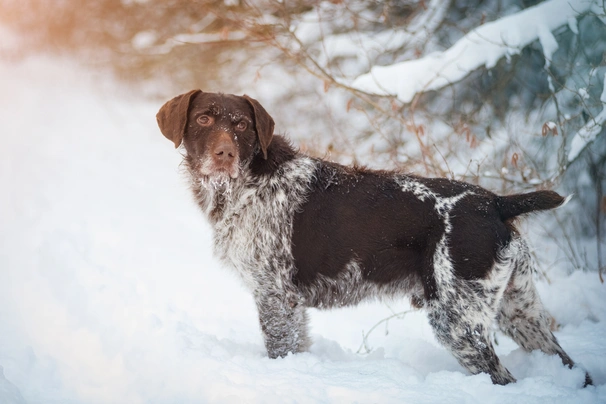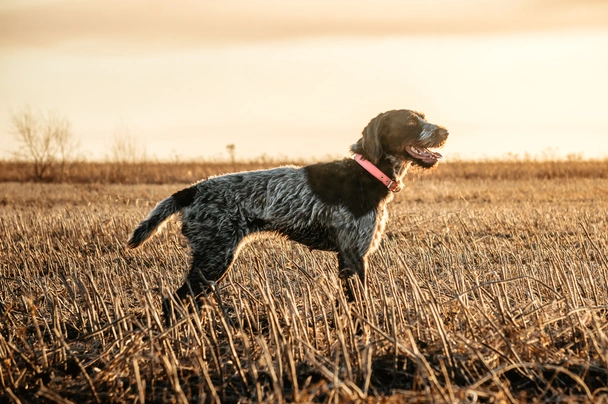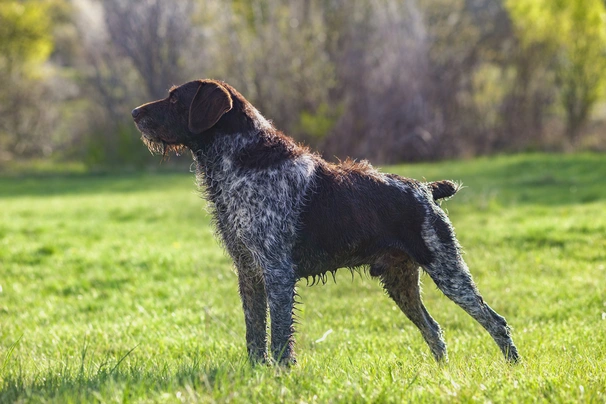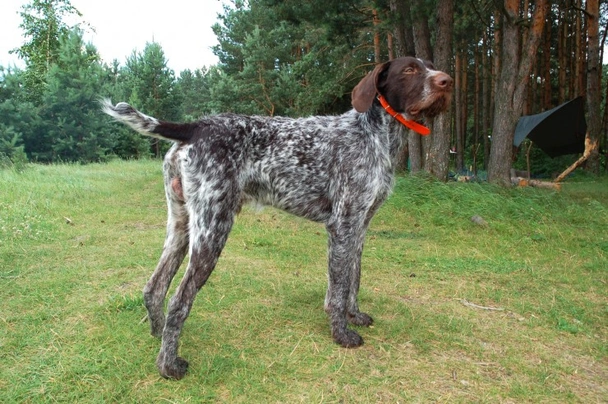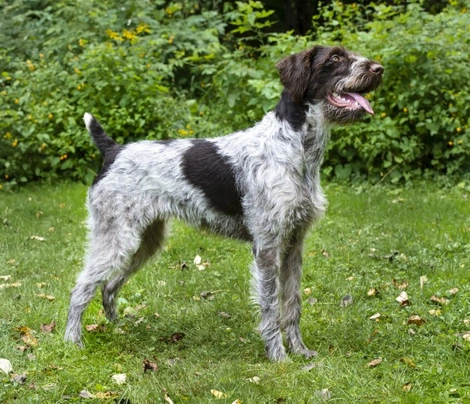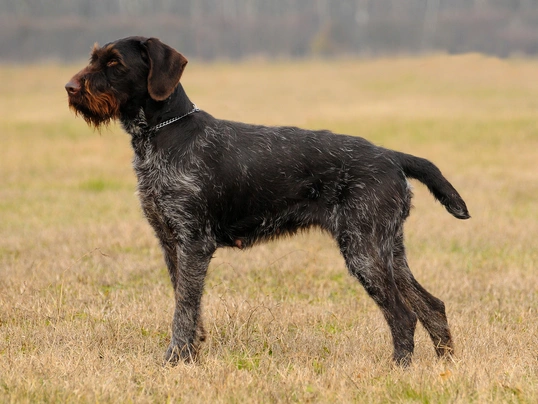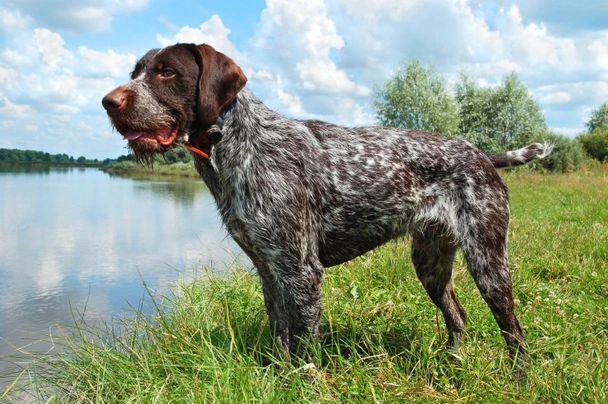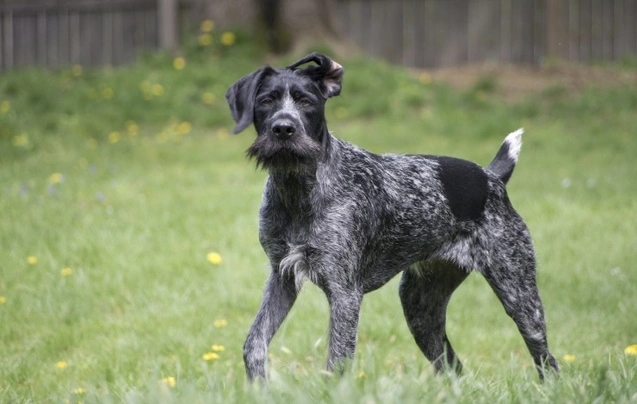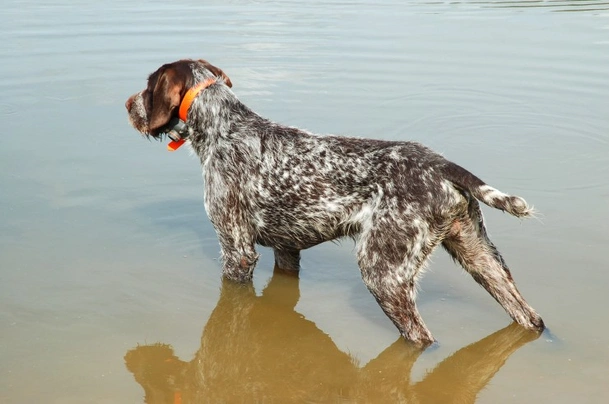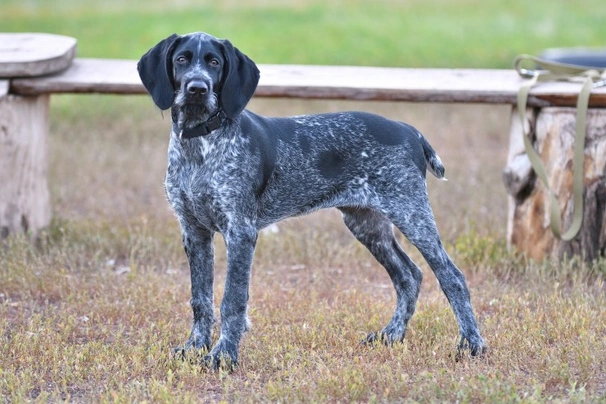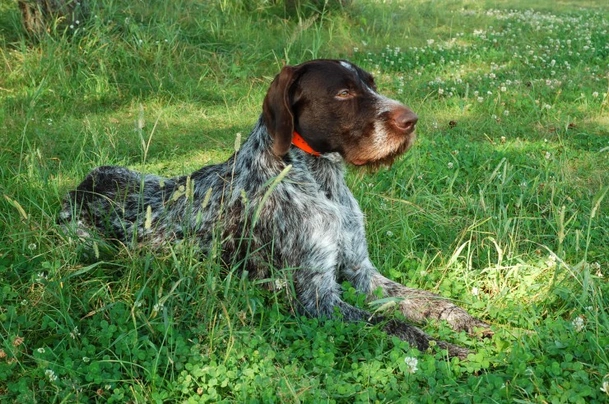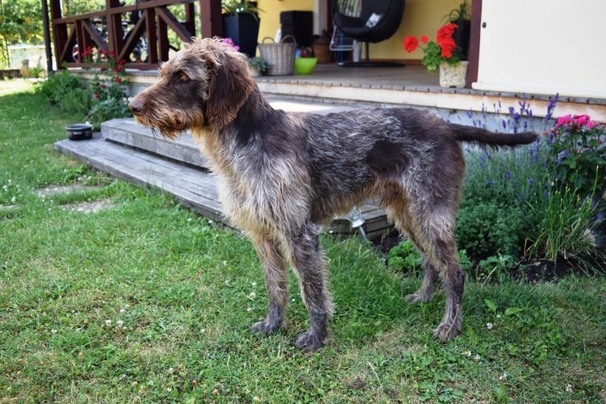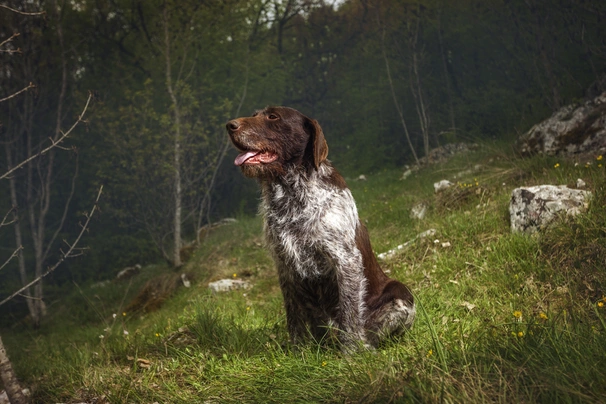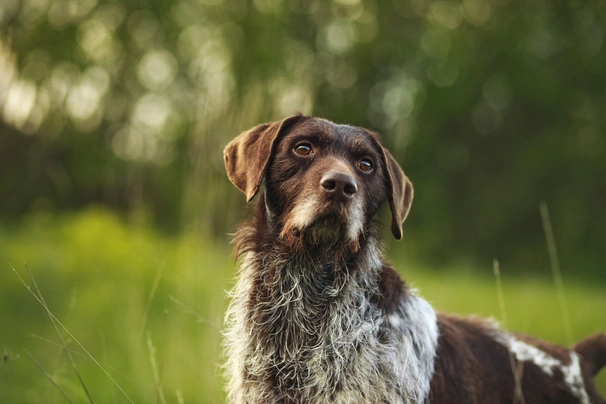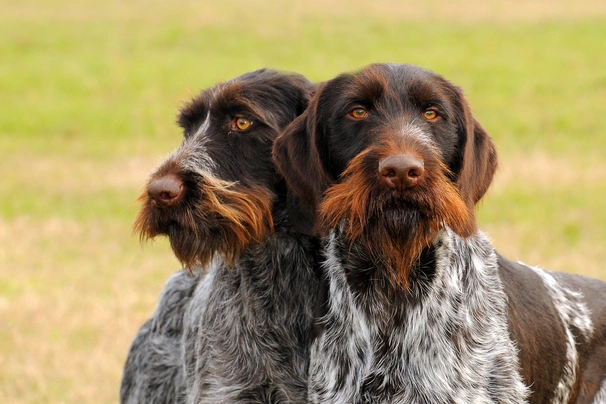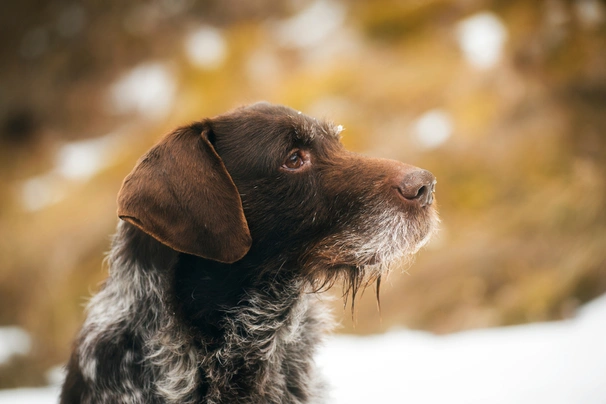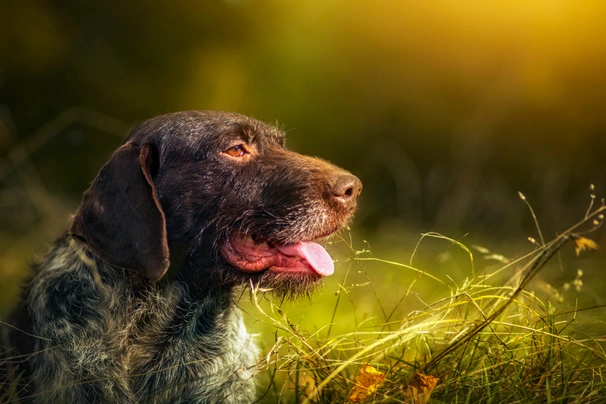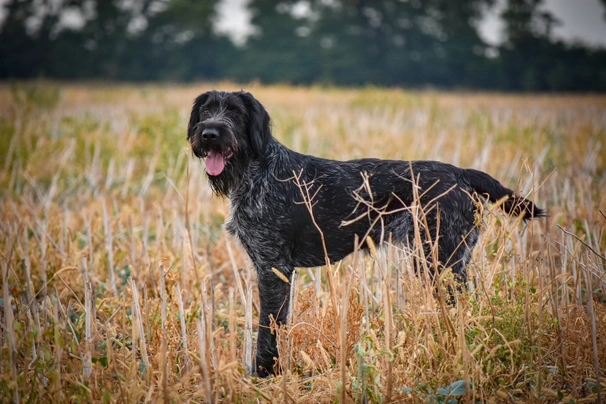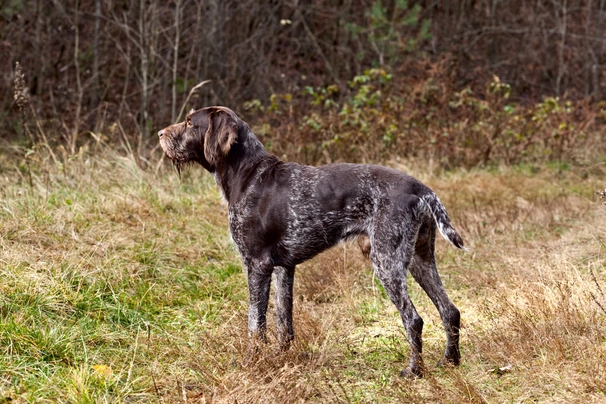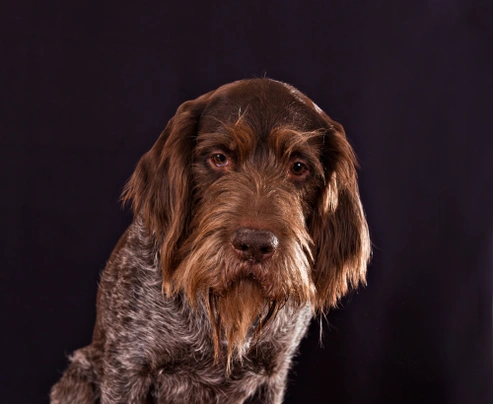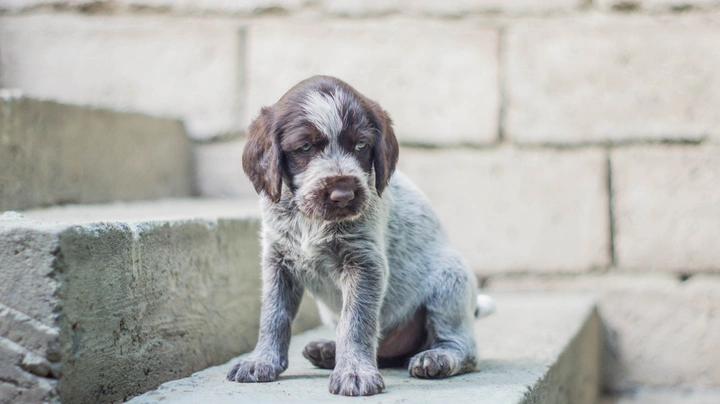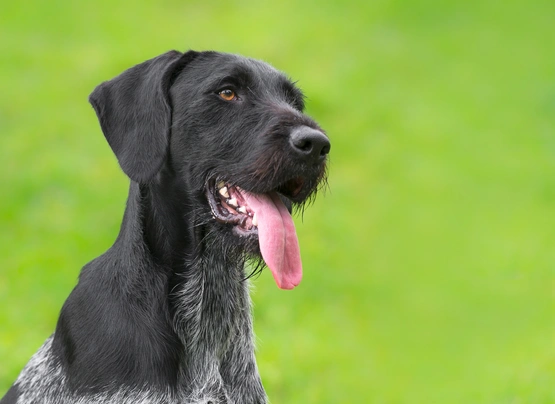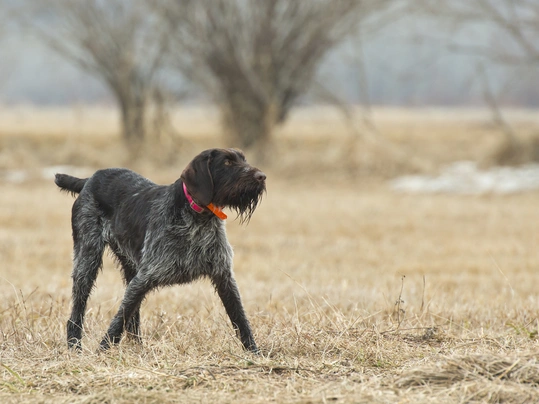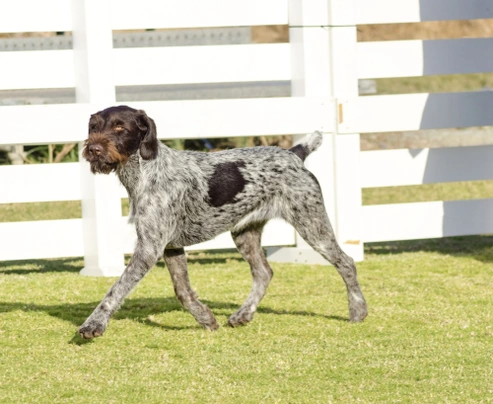German Wirehaired Pointer
Pros
Cons
Introduction of the German Wirehaired Pointer
The German Wirehaired Pointer is a handsome dog with their wiry coat and attractive facial furnishings which includes a charming beard bushy eyebrows and moustache which sets them apart from other pointer breeds. They are highly prized in their native Germany not only for their looks but for their working and hunting abilities too having consistently been the gundog of choice with hunters.
German Wirehaired Pointers only recently arrived on British shores but slowly the breed is gaining popularity not only as working dogs but as companions and family pets thanks to their kind and loyal natures and charming looks. With this said anyone wishing to share a home with a Germain Wirehaired Pointer would need to register their interest with breeders and go on a waiting list for the pleasure of doing so.
History of the German Wirehaired Pointer
The German Wirehaired Pointer first appeared on the scene during the 19th century when they were originally bred to hunt in more challenging environments a task they excelled at and for which they soon became highly prized in their native Germany. The breed was developed using other native German breeds which included the Deutscher Stichelhaar Deutscher Kurzhaar and the Pudelpointer as well as a few griffon type dogs too.
There are records of the breed that date as far back as 1880 when hunters wanted to create a versatile hardy dog capable of working in small groups or on their own. They needed a robust dog that would be able to withstand the elements and one that would be able to work on more challenging terrains which included in the higher mountainous regions of the land and over open plains.
The result of their endeavours was a dog that could do all of the above and one that boasted having a bristly coat that offered them a tremendous amount of protection against all weathers. By the late 1800's there were several types of pointers throughout Germany which led to separate clubs being established and so the GWP was established. The breed was introduced to the UK after their German Shorthair Pointer cousins and as such they are a relative newcomer to British shores. They are around an inch taller than the Shorthair Pointer but they always appear to be a lot bigger and heavier thanks to their thicker coarser coats. The breed was first recognised by the Kennel Club in the 1970's although their numbers remain quite low in the UK.
Today the GWP is just as highly prized for their hunting abilities in their native Germany as they were in the past although they are also very popular as companion dogs and family pets too thanks to their loyal and placid natures. They are popular with hunters in other parts of Europe which includes here in the UK. However thanks to more being known about the breed these handsome dogs are gaining popularity as companions and family pets too and more especially with people who live in rural locations and who lead active outdoor lives.
Interesting facts about the breed
- Is the German Wirehaired Pointer a vulnerable breed? No they have fast become a popular choice both in a domestic environment and as a working dog in the UK
- German Wirehaired Pointers are renowned for being extremely versatile gundogs
- The GWP is the 3rd most popular breed in their native Germany
- The Kennel Club breed standard for the German Wirehaired Pointers is very like the breed standard set out by the German Kennel Club
- Traditionally a German Wirehaired Pointer's tail was always docked but since the law banning the procedure came into effect in 2007 tail docking is now illegal with the exception being for some working breeds and if a dog suffers from some sort of health issue that requires their tails to be docked. The procedure must be agreed and authorised before being performed by a qualified vet.
Appearance of the German Wirehaired Pointer
Height at the withers: Males 60 - 67 cm Females 56 - 62 cm
Average weight: Males 25 - 34 kg Females 20 - 29 kg
The German Wirehaired Pointer is a handsome well-balanced dog and one that's immediately recognisable thanks to their distinctive wiry coat and charming facial hair. They are large athletic dogs that are not that dissimilar to the Italian Spinone when it comes to looks which is why they are often confused with one another.
Their heads are nicely balanced in proportion to the rest of the body with dogs having slightly rounded and quite broad skulls. They have a moderate stop and their muzzles are the same length as their skulls. Noses can either be black or liver depending on the colour of a dog's coat. They have oval shaped eyes that are medium in size and a nice dark colour. Ears are medium in size and set high on a dog's head. The GWP has a strong jaw with a perfect scissor bite where their upper teeth neatly overlap their lower ones.
Their necks are a nice length and powerful with dogs having sloping well-muscled shoulders and straight lean muscular front legs. The GWP has a nice compact powerful looking body with deep chests and well sprung deep ribs that extend well back. They have firm backs and nicely tucked up loins which adds to a dog's athletic appearance.
Their hindquarters are powerful strong with dogs having wide broad hips and a croup that falls away slightly towards the tail. Back legs are strong with well-muscled thighs and showing a good amount of bone. Feet are compact and close knit being a round to oval shaped with nicely arched toes and strong nails. Tails are carried horizontally and sometimes a little higher when a dog is alert or excited.
When it comes to their coat the German Wirehaired Pointer has a very dense harsh outer coat and a much softer thicker undercoat that provides dogs with a tremendous amount of protection against the elements. Their coats lie close with the hair on their heads and ears being shorter and thicker than it is on the rest of their body. They have bushy eyebrows and a nice full beard and moustache which adds to their endearing looks. The accepted breed colours include the following:
- Black & White
- Black & White Ticked
- Liver
- Liver & White
- Liver & White Ticked
- Liver Ticked
Gait/movement
When a German Wirehaired Pointer moves they do so with a smooth and free action covering a lot of ground with every stride. They have a lot of drive in their hindquarters with their elbows remaining straight neither turning inwards or outwards from a dog's body. They do not have a hackneyed action whatsoever.
Faults
The Kennel Club frowns on any exaggerations or departures from the breed standard and would judge the faults on how much they affect a dog's overall health and wellbeing as well as their ability to perform.
Males should have both testicles fully descended into their scrotums and it is worth noting that a dog can be a little lighter or heavier as well as slightly taller or shorter than set out in the Kennel Club breed standard which is given as a guideline only.
Temperament of the German Wirehaired Pointer
The German Wirehaired Pointer is an impressive looking dog but one that is known to be a gentle even tempered and affectionate character. They form strong bonds with their owners and families which sees them become extremely loyal and protective of them. They are intelligent high energy dogs that love to work both on land and in water being strong swimmers thanks in part to their webbed feet. Because they are so tireless a GWP needs to be given the right amount of daily exercise and mental stimulation for them to be truly happy well-rounded dogs. They are never happier than when they are doing something and therefore do well living with people who lead active outdoor lives and who live in more rural areas of the country.
They tend to be a little wary and aloof around people they don't know although rarely would a GWP show any sort of aggressive behaviour towards a stranger preferring to keep their distance until they get to know someone. With this said they are known to be very "people-oriented" and love nothing more than to be around them whenever they can.
It's important for these dogs to be well socialised from a young age so they grow up to be confident outgoing mature dogs. Their socialisation must include introducing them to lots of new situations noises people other animals and dogs once they have been fully vaccinated. It's also crucial for their training to start early too and it must be consistent throughout a dog's life. A GWP is never happier than when they know their place in the pack and who they can look to for direction and guidance. If they don't know who is the alpha dog in a household they may quickly take on the role of dominant dog which can make them harder to live with and handle.
Although they love to be in a home environment and rarely like to be too far away from their families and owners a GWP might occasionally decide to go off exploring on their own especially if they pick up an interesting scent. As such care should be taken as to where and when they can run free.
Are they a good choice for first time owners?
They are not the best choice for first time owners because they need to be trained and handled by people who are familiar with their specific needs which includes being given a tremendous amount of daily exercise and mental stimulation. Anyone wishing to share a home with a GWP would need to be prepared to spend a lot of time with their canine companions giving them enough exercise and mental stimulation for them to be truly happy well-balanced dogs.
What about prey drive?
GWPs have a strong prey drive which means care should always be taken as to where and when a dog can run off the lead more especially if there are other dogs animals wildlife or livestock close by. They can be aggressive around other dogs of the same sex too.
What about playfulness?
German Wirehaired Pointers have a very playful side to their natures and love to entertain and be entertained. They are very smart and quickly learn new things which includes what pleases an owner. They thrive on being given something to do and thoroughly enjoy playing all sorts of interactive games which includes finding items that have been hidden for them.
What about adaptability?
German Wirehaired Pointers are better suited to people who have large secure back gardens that they can roam around in whenever possible bearing in mind that the fencing must be high and very secure to keep these agile energetic dogs safely in. They are not well suited to apartment living for this reason.
What about separation anxiety?
German Wirehaired Pointers form very strong ties with their families and dogs are never very happy when they find themselves left on their own for longer periods of time. They are better suited to people who either work from home or in households where one person stays at home when everyone else is out so they are never alone for any length of time which could see a dog suffering from separation anxiety. This can lead to them being destructive around the home which is a dog's way of relieving any stress they are feeling and a way to keep themselves entertained which could include incessant barking.
What about excessive barking?
Some GWPs like the sound of their own voices a little too much which is something that needs to be gently nipped in the bud when a dog is still young being careful not to frighten them. Others will only bark when there are strangers about or when something they don't like is going on in their surroundings.
Do German Wirehaired Pointers like water?
Most GWPs like swimming and will take to the water whenever they can more especially when the weather is hot. However if anyone who owns a dog that does not like water should never force them to go in because it would just end up scaring them. With this said care should always be taken when walking a German Wirehaired Pointer off the lead anywhere near more dangerous watercourses just in case a dog decides to leap in and then needs rescuing because they can't get out of the water on their own.
Are German Wirehaired Pointers good watchdogs?
German Wirehaired Pointers are quite territorial by nature as such they are good watchdogs and would be quick off the mark to let an owner know when there are strangers about and when something they don't like is going on around them. With this said rarely would a GWP show any sort of aggressive behaviour preferring to keep their distance and bark.
Intelligence / Trainability of the German Wirehaired Pointer
Because the German Wirehaired Pointer is such an intelligent dog in the right hands and environment they are easy to train and love nothing more than the one-to-one attention they are given during a training session. The key to successfully training a GWP is to start their education as early as possible and to keep their training sessions short and as interesting as possible so that a dog stays more focused. If things get too repetitive a GWP would soon get bored and start looking around for other more interesting things to focus on. They do best when their minds are challenged which means keeping them occupied mentally and physically.
They are known to be a little wilful at times which is why obedience training is a must for these smart energetic dogs. However because they are quite sensitive by nature it's important not to use any sort of harsh correction or heavier handed training methods which would not bring out the best in these dogs and if anything it would do them a lot of harm. They do respond well to positive reinforcement which always brings out a GWP's natural talents.
German Wirehaired Pointer puppies are very sweet and it is all too easy to spoil them when they first arrive in their new homes. However all puppies need to be taught the rules and given boundaries so they understand what is expected of them. It also helps establish their place in the pack and who is the alpha dog in a household. The earlier this is established the happier a puppy would be. As such the first commands a GWP should be taught are as follows:
- Come
- Sit
- Stay
- Quiet
- Leave it
- Down
- Bed
Children and other
German Wirehaired Pointers are known to be gentle when they are around children but due to their larger size care must be taken when they are near toddlers and younger children in case they knock them over albeit by accident. As such any interaction between children and a dog should always be supervised by an adult to make sure playtime goes not get too boisterous.
When dogs have been well socialised from a young enough age they generally get on well with other dogs they meet. If they have grown up with a family cat in a household they usually get on well together. However a GWP would think nothing of chasing off any other cats they encounter because they would see them as fair game. Care must be taken when they are around any smaller animals and pets because of their high prey drive as such any contact is best avoided.
Health of the German Wirehaired Pointer
The average life expectancy of a German Wirehaired Pointer is between 9 and 12 years when properly cared for and fed an appropriate good quality diet to suit their ages.
Like so many other breeds the GWP is known to suffer from a few hereditary health issues which are worth knowing about if you are planning share your home with one of these active and good-looking dogs. The conditions that seem to affect the breed the most include the following:
- Hip dysplasia - Breeders should have stud dogs hip scored
- von Willebrand's disease - Test available
- Dilated cardiomyopathy (DCM) - test available through breed club
- Atopy (a sensitivity that causes allergies)
- Idiopathic epilepsy
- Entropion (Eyelids Folding Inwards)
- Osteochondritis dissecans
- Hypothyroidism (underactivity of thyroid gland)
- Cataracts
- Bloat/gastric torsion
It is worth noting that the average COI for the German Wirehaired Pointers stands at 3/6% according to the Kennel Club statistics.
What about vaccinations?
GWP puppies would have been given their initial vaccinations before being sold but it is up to their new owners to make sure they have their follow-up shots in a timely manner with the vaccination schedule for puppies being as follows:
- 10 -12 weeks old bearing in mind that a puppy would not have full protection straight away but would be fully protected 2 weeks after they have had their second vaccination
There has been a lot of discussion about the need for dogs to have boosters. As such it's best to talk to a vet before making a final decision on whether a dog should continue to have annual vaccinations which are known as boosters.
What about spaying and neutering?
A lot of vets these days recommend waiting until dogs are slightly older before spaying and neutering them which means they are more mature before undergoing the procedures. As such they advise neutering males and spaying females when they are between the ages of 6 to 9 months old and sometimes even when a dog is 12 to 14 months old which is the case for German Wirehaired Pointer.
Other vets recommend spaying and neutering dogs when they are 6 months old but never any earlier unless for medical reasons. With this said many breeds are different and it is always advisable to discuss things with a vet and then follow their advice on when a dog should be spayed or neutered.
What about obesity problems?
Some GWPs can gain weight after they have been spayed or neutered and it's important to keep an eye on a dog's waistline just in case they do. If a dog starts to put on weight it's important to adjust their daily calorie intake and to up the amount of exercise they are given. Older dogs too are more prone to gaining weight and again it's essential they be fed and exercised accordingly because obesity can shorten a dog's life by several years. The reason being that it puts a lot of extra strain on a dog's internal organs including the heart which could prove fatal.
What about allergies?
German Wirehaired Pointers are prone to suffering from allergies and it's important for a dog to see a vet sooner rather than later if one flares up. Allergies can be notoriously hard to clear up and finding the triggers can be challenging. With this said a vet would be able to make a dog with an allergy more comfortable while they try to find out the triggers which could include the following:
- Certain dog foods that contain high levels of grain and other cereal fillers
- Airborne pollens
- Dust mites
- Environment
- Flea and tick bites
- Chemicals found in everyday household cleaning products
Participating in health schemes
All responsible GWP breeders would ensure that their stud dogs are tested for known hereditary and congenital health issues known to affect the breed by using the following schemes:
- BVA/KC Hip Dysplasia Scheme
- DNA test - vWD
- Breed club testing for Dilated cardiomyopathy (DCM)
- Haemophilia B Factor 1X Deficiency
- Exercise Induced Collapse (EIC)
- Junctional Epidermolysis Bullosa (JEB)
What about breed specific breeding restrictions?
As of January 1st 2015 only German Wirehaired Pointers that have tested clear of Von Willebrand's disease can be registered with the Kennel Club which in short means that both parents of puppies must have tested clear.
Any identified "carriers" of vWD should only be bred to German Wirehaired Pointers that have DNA tested clear of the disorder through the BVA/KC scheme.
What about Assured Breeder Requirements?
It is mandatory for all Kennel Club Assure Breeders to use the following schemes and the Kennel Club strongly recommends that all other breeders follow suit:
Caring for the German Wirehaired Pointer
As with any other breed GWP's need to be groomed on a regular basis to make sure their coats and skin are kept in top condition. They also need to be given regular daily exercise to ensure they remain fit and healthy. On top of this dogs need to be fed good quality food that meets all their nutritional needs throughout their lives.
Caring for a German Wirehaired Pointer puppy
German Wirehaired Pointers puppies are boisterous and full of life which means it's essential for homes and gardens to be puppy-proofed well in advance of their arrival. A responsible breeder would have well socialised their puppies which always leads to more outgoing confident and friendly dogs right from the word go. With this said any puppy is going to feel vulnerable when they leave their mother and littermates which must be taken into account. The longer a puppy can remain with their mother the better although it should never be for too long either.
It's best to pick a puppy up when people are going to be around for the first week or so which is the time needed for a puppy to settle in. Puppy-proofing the home and garden means putting away any tools and other implements that a boisterous puppy might injure themselves on. Electric wires and cables must be put out of their reach because puppies love chewing on things. Toxic plants should be removed from flowerbeds and the home too.
Puppies need to sleep a lot to grow and develop as they should which means setting up a quiet area that's not too out of the way means they can retreat to it when they want to nap and it's important not to disturb them when they are sleeping. It's also a good idea to keep "playtime" nice and calm inside the house and to have a more active "playtime" outside in the garden which means puppies quickly learn to be less boisterous when they are inside.
The documentation a breeder provides for a puppy must have all the details of their worming date and the product used as well as the information relating to their microchip. It is essential for puppies to be wormed again keeping to a schedule which is as follows:
- Puppies should be wormed at 6 months old
- They need to be wormed again when they are 8 months old
- Puppies should be wormed when they are 10 months old
- They need to be wormed when they are 12 months old
Things you'll need for your puppy
There are certain items that new owners need to already have in the home prior to bringing a new puppy home. It's often a good idea to restrict how much space a puppy plays in more especially when you can't keep an eye on what they get up to bearing in mind that puppies are often quite boisterous which means investing in puppy gates or a large enough playpen that allows a puppy the room to express themselves while keeping them safe too. The items needed are therefore as follows:
- Good quality puppy or baby gates to fit on doors
- A good well-made playpen that's large enough for a puppy to play in so they can really express themselves as puppies like to do
- Lots of well-made toys which must include good quality chews suitable for puppies to gnaw on bearing in mind that a puppy will start teething anything from when they are 3 to 8 months old
- Good quality feed and water bowls which ideally should be ceramic rather than plastic or metal
- A grooming glove
- A slicker brush or soft bristle brush
- Dog specific toothpaste and a toothbrush
- Scissors with rounded ends
- Nail clippers
- Puppy shampoo and conditioner which must be specifically formulated for use on dogs
- A well-made dog collar or harness
- A couple of strong dog leads
- A well-made dog bed that's not too small or too big
- A well-made dog crate for use in the car and in the home that's large enough for a puppy to move around in
- Baby blankets to put in your puppy's crate and in their beds for when they want to nap or go to sleep at night
Keeping the noise down
All puppies are sensitive to noise including German Wirehaired Pointer puppies. It's important to keep the noise levels down when a new puppy arrives in the home. TVs and music should not be played too loud which could end up stressing a small puppy out.
Keeping vet appointments
As previously mentioned GWP puppies would have been given their first vaccinations by the breeders but they must have their follow up shots which is up to their new owners to organise. The vaccination schedule for puppies is as follows:
- 10 -12 weeks old bearing in mind that a puppy would not have full protection straight away but would only be fully protected 2 weeks after they have had their second vaccination
When it comes to boosters it's best to discuss these with a vet because there is a lot of debate about whether a dog really needs them after a certain time. However if a dog ever needed to go into kennels their vaccinations would need to be fully up to date.
What about older German Wirehaired Pointers when they reach their senior years?
Older GWPs need lots of special care because as they reach their golden years they are more at risk of developing certain health concerns. Physically a dog's muzzle may start to go grey but there will be other noticeable changes too which includes the following:
- Coats become coarser
- A loss of muscle tone
- GWPs can either become overweight or underweight
- They have reduced strength and stamina
- Older dogs have difficulty regulating their body temperature
- They often develop arthritis
- Immune systems do not work as efficiently as they once did which means dogs are more susceptible to infections
Older dogs change mentally too which means their response time tends to be slower as such they develop the following:
- They respond less to external stimuli due to impaired vision or hearing
- They tend to be a little pickier about their food
- They have a lower pain threshold
- Become intolerant of any change
- Often an older dog can feel disorientated
Living with a German Wirehaired Pointer in their golden years means taking on a few more responsibilities but these are easily managed and should include looking at their diet the amount of exercise they are given how often their dog beds need changing and keeping an eye on the condition of their teeth.
Older German Wirehaired Pointers need to be fed a good quality diet that meets their needs at this stage of their lives all the while keeping a close eye on a dog's weight. A rough feeding guide for older dogs is as follows bearing in mind they should be fed highly digestible food that does not contain any additives:
- Protein content should be anything from 14 – 21%
- Fat content should be less than 10%
- Fibre content should be less than 4%
- Calcium content should be 0.5 – 0.8%
- Phosphorous content should be 0.4 – 0.7%
- Sodium content should be 0.2 – 0.4%
Older German Wirehaired Pointers don't need to be given the same amount of daily exercise as a younger dog but they still need the right amount of physical activity to maintain muscle tone and to prevent a dog from putting on too much weight. All dogs need access to fresh clean water and this is especially true of older dogs when they reach their golden years because they are more at risk of developing kidney disorders.
Grooming of the German Wirehaired Pointer
Although the GWP has a slightly longer coat than their shorthaired cousins they are low maintenance on the grooming front. However because they have moustaches and beards it's important to clean a dog's mouth after they have eaten because food tends to get stuck in the longer hair. Not only can this become smelly if not regularly cleaned but it can provide the perfect environment for bacteria to thrive in.
They shed throughout the year only more so during the Spring and then again in the Autumn when more frequent grooming is usually necessary to keep on top of things and to remove any dead or loose hair from a dog's coat. It's also important to check a dog's ears on a regular basis and to clean them when necessary. If too much wax builds up in a dog's ears it can lead to a painful infection which can be hard to clear up. In short prevention is often easier than cure when it comes to ear infections.
Exercise of the German Wirehaired Pointer
The German Wirehaired Pointer is a high energy intelligent dog and as such they need to be given the right amount of daily exercise and mental stimulation for them to be truly happy well-rounded dogs. They need to be given a minimum of 2 hour's exercise a day with as much off the lead time as possible. If they are not given the right amount of mental stimulation and exercise every day a GWP would quickly get bored and could even begin to show some destructive behaviours around the home.
A shorter walk in the morning would be fine but a longer more interesting one in the afternoon is a must. These dogs also like to be able to roam around a back garden as often as possible so they can really let off steam. However the fencing must be extremely secure to keep these high energy dogs in because if they find a weakness in the fence they will soon escape out and get into all sorts of trouble.
With this said GWP puppies should not be over exercised because their joints and bones are still growing. This includes not letting a dog jump up and down from furniture or going up or down the stairs. Too much pressure placed on their joints and spines at an early age could result in a dog developing serious problems later in their lives.
Feeding of the German Wirehaired Pointer
If you get a GWP puppy from a breeder they would give you a feeding schedule and it's important to stick to the same routine feeding the same puppy food to avoid any tummy upsets. You can change a puppy's diet but this needs to be done very gradually always making sure they don't develop any digestive upsets and if they do it's best to put them back on their original diet and to discuss things with the vet before attempting to change it again.
Older dogs are not known to be fussy eaters but this does not mean they can be given a lower quality diet. It's best to feed a mature dog twice a day once in the morning and then again in the evening making sure it's good quality food that meets all their nutritional requirements. It's also important that dogs be given the right amount of exercise so they burn off any excess calories or they might gain too much weight which can lead to all sorts of health issues. Obesity can shorten a dog's life by several years so it's important to keep an eye on their waistline from the word go.
Because GWP's are known to suffer from bloat it is important for them to be fed twice a day instead of giving a dog just one larger meal a day. It's also a good idea to invest in a stand for their feed bowls which makes it easier for these large dogs to eat comfortably without having to stretch their necks down to reach their food. Dogs should never be exercised just before or just after they have eaten either because this puts them more at risk of suffering from gastric torsion.
Feeding guide for a German Wirehaired Pointer puppy
Puppies need to be fed a highly nutritious good quality diet for them to develop and grow as they should. As a rough guide a GWP puppy can be fed the following amounts every day making sure their meals are evenly spread out throughout the day and it's best to feed them 3 or 4 times a day:
- 2 months old - 244g to 286g depending on puppy's build
- 3 months old - 307g to 365g depending on puppy's build
- 4 months old - 334g to 400g depending on puppy's build
- 5 months old - 261g to 454g depending on puppy's build
- 6 months old - 385g to 505g depending on puppy's build
- 7 months old - 383g to 506g depending on puppy's build
- 8 months old - 354g to 471g depending on puppy's build
- 9 months old - 329g to 440g depending on puppy's build
- 10 months old - 298g to 402g depending on puppy's build
- 11 months old - 270g to 365g depending on puppy's build
- 12 months old - 268g to 363g depending on puppy's build
- 13 months old - 266g to 360g depending on puppy's build
- 14 months old - 266g to 357g depending on puppy's build
Once a puppy is 15 months old they can be fed adult dog food.
Feeding guide for an adult German Wirehaired Pointer
Once fully mature an adult German Wirehaired Pointer must be fed a good quality diet to ensure their continued good health. As a rough guide an adult GWP can be fed the following amounts every day:
- Dogs weighing 20 kg can be fed 256g to 343g depending on activity
- Dogs weighing 25 kg can be fed 276g to 363g depending on activity
- Dogs weighing 29 kg can be fed 307g to 404g depending on activity
- Dogs weighing 34 kg can be fed 337g to 443g depending on activity
German Wirehaired Pointer price
If you are looking to buy a German Wirehaired Pointer you would need to pay anything from £550 to over £750 for a well-bred pedigree puppy and you may need to register your interest with breeders because very few puppies are bred and registered with The Kennel Club every year. The cost of insuring a male 3-year-old German Wirehaired Pointer in northern England would be £23.43 a month for basic cover but for a lifetime policy this would set you back £59.32 a month (quote as of February 2018). When insurance companies calculate a pet's premium they factor in several things which includes where you live in the UK a dog's age and whether they have been neutered or spayed among other things.
When it comes to food costs you need to buy the best quality food whether wet or dry making sure it suits the different stages of a dog’s life. This would set you back between £40 - £50 a month. On top of this you need to factor in veterinary costs if you want to share your home with a GWP and this includes their initial vaccinations their annual boosters the cost of neutering or spaying a dog when the time is right and their yearly health checks all of which quickly adds up to over £1200 a year.
As a rough guide the average cost to keep and care for a German Wirehaired Pointer would be between £70 to £120 a month depending on the level of insurance cover you opt to buy for your dog but this does not include the initial cost of buying a well-bred healthy Kennel Club registered pedigree German Wirehaired Pointer puppy.
Buying advice
When visiting and buying any puppy or dog there are many important things to consider and questions to ask of the breeder/seller. You can read our generic puppy/dog advice here which includes making sure you see the puppy with its mother and to verify that the dog has been wormed and microchipped.
German Wirehaired Pointers are a popular breed both in the UK and elsewhere in the world which means that well-bred puppies can often command a lot of money. As such with German Wirehaired Pointers there is specific advice questions and protocols to follow when buying a puppy which are as follows:
- Beware of online scams and how to avoid them. You may see online and other adverts by scammers showing images of beautiful German Wirehaired Pointerpuppies for sale at very low prices. However the sellers ask buyers for money up front before agreeing to deliver a puppy to a new home. Potential buyers should never buy a puppy unseen and should never pay a deposit or any other money online to a seller. You should always visit the pet at the sellers home to confirm they are genuine and make a note of their address.
- As previously touched upon German Wirehaired Pointers are popular dogs in the UK. As such there are many amateur breeders/people who breed from a dam far too often so they can make a quick profit without caring for the welfare of the puppies their dam or the breed in general. Under Kennel Club rules a dam can only produce 4 litters and she must be between a certain age to do so. Anyone wishing to buy a GWP puppy should think very carefully about who they purchase their puppy from and should always ask to see the relevant paperwork pertaining to a puppy's lineage their vaccinations and their microchipping.
- Prospective owners should be very careful when buying a GWP with a docked tail. Tail docking is now banned in England and Wales although some working breeds can still have their tails docked in England and Wales providing the correct paperwork is supplied to the right authorities and the procedure is carried out by a qualified vet. There is a total ban on tail docking in Scotland. Docking tails without the correct authorisation carries a heavy fine.
